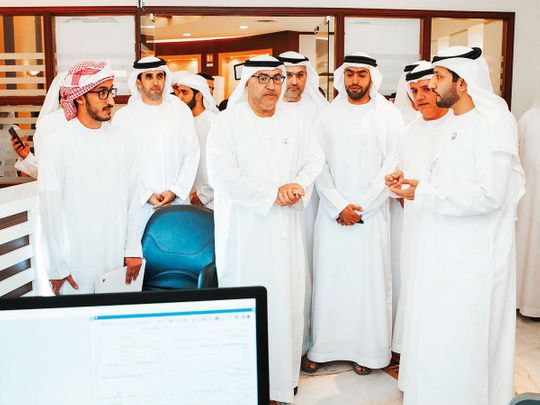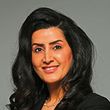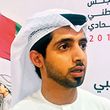
Abu Dhabi: A top official praised the growing role of women ahead of October’s Federal National Council (FNC) elections, on Monday.
There will now be 20 elected female, as well as 20 elected male representatives, it was announced earlier this month, raising the participation of women to 50 per cent up from 5 per cent at the last election in 2015, when just one female representative was elected alongside 19 men.
“Fifty per cent female representation is a fitting goal for a nation that has long prioritised gender equality, and is keen that women play a leading role in all fields especially in advancing parliamentary work, serving the country and representing their fellow citizens,” said Abdul Rahman Al Owais, Minister of Health and Prevention, Minister of State for Federal National Council Affairs, and Chairman of the National Election Committee, during a tour of the Abu Dhabi FNC Candidate Registration Centre in the Abu Dhabi Chamber of Commerce and Industry on Monday.
“The UAE’s leadership has long prided itself on setting a unique parliamentary experience that matches its rich heritage and values, but imitates none,” he added.
Rwanda, Bolivia and Cuba currently boast the highest female representation in parliament and the UAE plans to join these countries.
In October, the UAE will hold its largest election to date, with more than 337,000 Emiratis eligible to vote and elect 20 of the 40-member House. The remaining 20 members will be hand-picked by the Rulers of the emirates.
Dubai and Abu Dhabi are allocating two seats for women out of the total number of seats designated for each emirate by election, while Ajman, Fujairah and Umm Al Quwain are each designating one seat for a female candidate following the election from two seats designated to each emirate. Sharjah and Ras Al Khaimah have not dedicated any seats for women through the election mechanism, but will follow the appointment approach to comply with the 50 per cent stipulation.
Electoral roll also increases
Al Owais said in keeping with directives, the UAE will continue to empower women, pointing out that the electoral roll also represents a 50 per cent increase in voters compared with the previous election.
During the last FNC election in 2015, about 224,000 Emiratis were eligible to vote, up from 129,000 in 2011 and from fewer than 7,000 in 2006.
Al Owais reiterated that the surge in the pool of voters is yet another step in the UAE’s political empowerment and engagement journey.
“It reinforces the keen interest of the country’s leadership in enabling citizens to participate in decision-making,” he said.
The rolls of voters also include more women and young people, with Emirati women representing 50.62 per cent and people aged 21 to 40 making up 61.32 per cent.
Mozah Humaid, 36, a hopeful candidate of the FNC, told Gulf News she would seek to change HR laws to help strike the perfect balance between career and family, which has always been a challenge for Emirati workers — men and women.
“Our schedules are getting busier than ever before, which often causes our work or our personal lives to suffer, but modern employees demand greater control over their lives and a bigger say in the structure of their jobs,” she said.
Humaid, a mother of two and a life coach, said she highly appreciated the latest move to increase Emirati women’s participation in politics
She added she would take the opportunity to help create a family-friendly work environment that has proven to benefit both employers and employees in a variety of different industries.
Abdullah Mohammad Nakhira Al Daheri, 29, said the FNC acts as the voice of the people and he sought to relay this voice to the Government.
“As a member of the House I hear what the people are saying and relay those concerns to the Government. That way, the FNC identify problems and help the Government find solutions,” he said.
Al Daheri added that the public must engage more.
“For FNC members to succeed in acting as the citizens’ eyes and ears they must see and hear members of the public,” he said, before adding that improving education, health and the judicial system are his top priorities.










